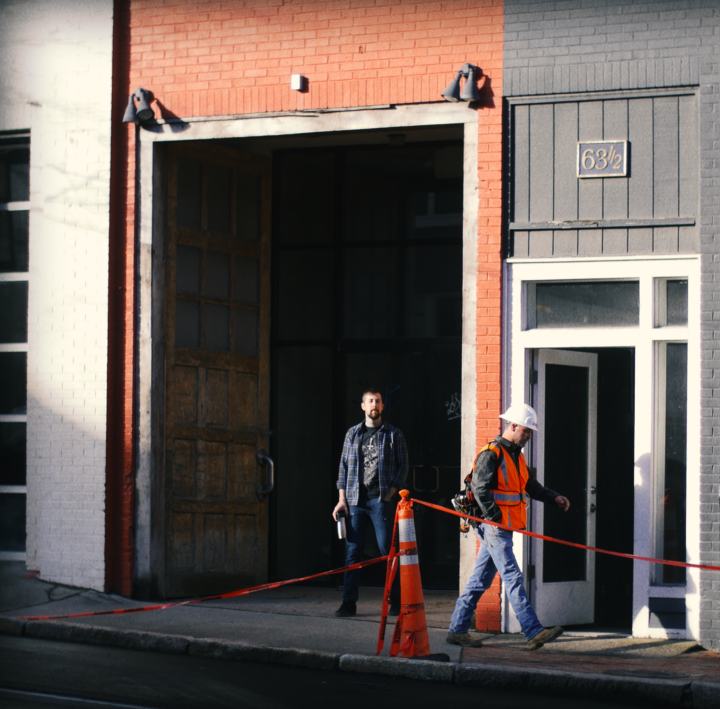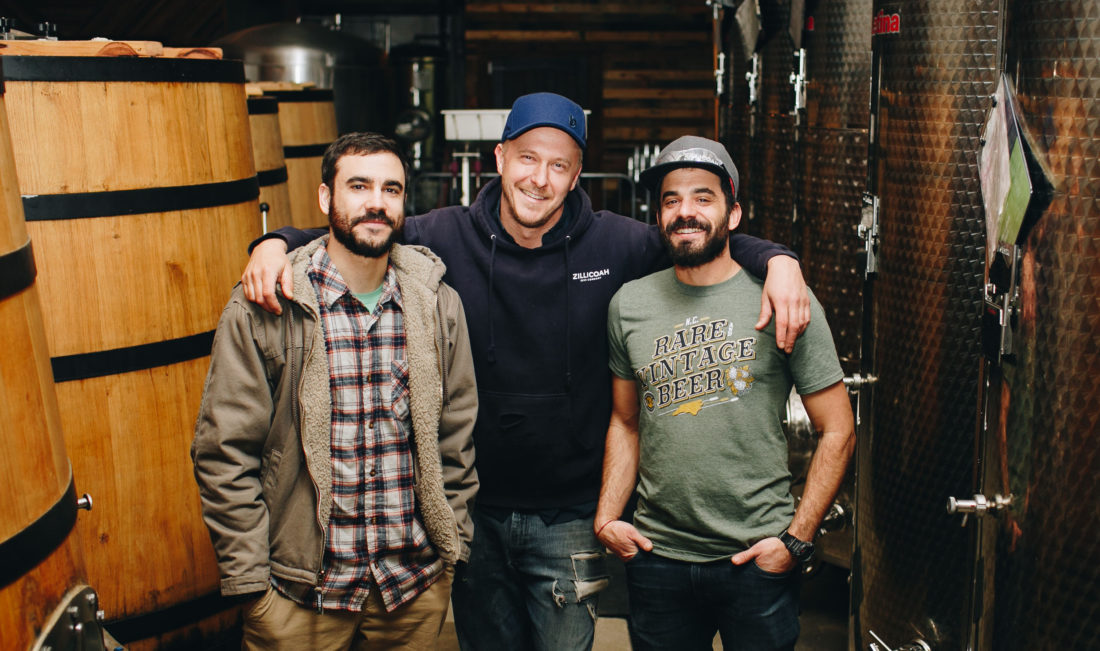Zillicoah Beer Co. opened a few miles outside downtown Asheville on the banks of the French Broad River in late October 2017, just as the weather was turning cold. The start date was later in the year than Jeremy Chassner and his fellow co-owners anticipated, and that had them nervous from a business perspective. But, as it turned out, their worries were for naught.
“The surrounding neighborhoods showed up every day and kept us afloat through our first winter. That meant everything to us, and we try to be really cognizant of that and strive to keep them happy,” Chassner says. “We have countless familiar faces in every day of the week [and] have neighborhood folks tell us pretty often how happy they are that we’re here.”
The outpouring of support from the Woodfin community is one sign of a continued desire among area beer drinkers for new breweries in an established, competitive and increasingly crowded market.
“The Asheville area is a great place to be involved in beer,” Chassner says. “Craft beer has been infused into this community for some time now. There’s still a strong interest, support system and desire for great beer from both locals and tourists, and it’s very much a way of life around here.”
Local perks
The same sense of community and joining the ranks of institutions like Highland Brewing Co., Green Man Brewery and Pisgah Brewing Co. that forged the local beer culture is part of what attracted the DSSOLVR team of co-founder/head brewer Vince Tursi and co-founder/creative director Michael Semenec to Asheville. Aiming to open their brewery on the Lexington Avenue side of the historic Tyler Building in late 2019, the duo were also drawn south by Asheville’s relative affordability compared with their native Boston.
Tursi and Semenec initially considered opening a brewery in Boston in 2010, then set their sights on Portland, Maine, and nearly signed a lease on a property just up the street from Alagash Brewing Co. But neither location panned out, and the industry climate changed to where, Tursi says, a massive taproom and significant distribution were required for formerly small breweries to remain economically viable. So the business partners looked elsewhere.
In Asheville, they saw the potential to realize their long-held dream of a downtown space on a budget that Tursi says “wouldn’t have put [them] near the city of Boston.” Further appealing was the freedom to escape New England’s prohibitive stylistic scene, where he notes that by popular demand the eponymous cloudy IPAs compose over 60% of practically every brewery’s portfolio.
“Because we’re drawing in people from such a wide breadth in terms of where tourists are coming in, and, in general, just how many cities we’re completely surrounded by and how much of a rich, diverse culture is being consistently brought in to Asheville, we had the opportunity to kind of brew whatever we want and not be stylistically limited and be welcomed with significantly more open arms,” Tursi says. “It seems like Asheville is the perfect place to kind of have no rules and invent yourself and do everything.”
With that creative independence, however, comes great responsibility. As the city is undergoing significant growth and adjusting to life on a national scale in terms of of visibility — augmented all the more by players with significant marketing budgets and bandwidths like Wicked Weed Brewing and the incoming CANarchy Craft Brewery Collective — the proverbial playing field has been elevated.
“You can’t half-ass this shit anymore — pardon my French. If you’re coming into Asheville, you have to have experience. You have to know what you’re doing, you have to be hitting on multiple levels, you have to have a reason to draw people to you,” Tursi says.
“The barrier of entry is that minimum bar is just consistently — as much growth as we’re seeing — that bar is going way up. It’s forcing people to give it increased brand equity, increased visibility, actually supply money into marketing and grow and evolve as a business. On one hand, it’s kind of a pro. On the other hand, it’s kind of a con. You can’t be stagnant or comfortable anymore. You just have to be driven now.”

Chassner concurs with the strong presence of that competitive spirit, which he notes arises despite the exceptional camaraderie and hospitality among Asheville’s high concentration of breweries. “There’s definitely an undying pressure to continue to separate yourself and draw customers into your brewery,” he says. “But in reality, and we talk about this often at the brewery, we don’t see this as a con. It drives us to refuse to rest on our laurels, continue to work on making better beer and continue to improve our customer experience.”
The DSSOLVR team also stresses the importance of a positive taproom experience to help create brand attachment, ensure repeat business and distance oneself from the field. In addition to brewing high-quality beer, they firmly believe that developing a brand voice has become an important component in a brewery’s success, and doing so early, say Semenc and Tursi, has helped DSSOLVR significantly in the beginning of its launch.
“We can essentially try to hype our business so when we do open up, people know who we are,” Semenec says. “We’re really pushing on the outside of Asheville and even outside of North Carolina to try to draw in some more of the tourists that are thinking about coming to visit. That’s more to the fact about the growth of these newer breweries: Tourists are always going to want a newer, fresher experience. The more that’s opened up and rotated through, I’d say the better for the industry as a whole within North Carolina and Asheville particularly.”
The bigger picture
While the influx of visitors who come to Asheville primarily for its beer is rising and can seem overwhelming on any given weekend, taprooms rank well below the city’s other attractions in terms of popularity. Marla Tambellini, deputy director and vice president of marketing for Explore Asheville Convention & Visitors Bureau, notes that her group has worked closely with local craft breweries since Highland’s inception 25 years ago, but in context with the city’s overall food and beverage industry, not as a singular entity.
“We ask visitors what their primary motivation is for coming to the area. A decade ago, culinary and beer were at the very bottom. They’ve come up a little bit but are outpaced by many primary motivators like the mountains, the Biltmore House and going downtown,” Tambellini says. “That doesn’t exclude other contributing experiences they want to add to their itinerary, but it’s hard to tease that out. Markets familiar with us are more likely to indicate food and beer, but for markets further away, it doesn’t generally rise to a key motivator.”
On the economic side, Clark Duncan, executive director and senior vice president of the Economic Development Coalition for Asheville-Buncombe County, reports that brewery employment growth remains an important part of the Asheville region’s prosperity.
“Year-over-year job growth in advanced manufacturing in the Asheville Metropolitan Statistical Area as of July 2018 was 6.3% — outpacing both health care and hospitality sectors,” Duncan says. “This is good news because the advanced manufacturing sector pays higher wages and attracts greater capital investment than other leading employment sectors in the Asheville Metro. Beverage manufacturing, motor vehicle parts manufacturing and plastic product manufacturing were driving that growth — and at rates two to three times the state and national averages.”
Duncan adds that the craft brewing industry has also made an impact on the start-up scene with new innovation coming from such tech start-ups as Craftpeak and BrewStream. Meanwhile, nationally recognized brands like White Labs and Riverbend Malt House strengthen the supply chain, diversifying the local economy and bringing collaboration, savings and greater efficiencies to the area brewers. Duncan sees continued growth potential in fortifying those brewing support services, in turn benefiting the breweries themselves.
Asheville-based attorney Derek Allen of Ward and Smith, P.A., who works with nearly every local brewery, is also optimistic about new businesses joining the scene, as long as they make quality products and offer an authentic experience. But as Asheville’s existing breweries seek to expand their distribution and enter new markets, he sees an analog on the West Coast.
“I think San Diego is a good model for us to look at in terms of what happens when you have that many breweries in the same area. They start to open up second, third, fourth and fifth locations. That was the Stone [Brewing Co.] model, that was the Ballast Point [Brewing Co.] model, and I don’t think we’re any different,” Allen says.
“That retail space where you are at a brewery, delivering the experience in a place where you can brew the beer and put it into the consumers’ hands directly is a very powerful experience. And without that, you’ll have a very difficult time forming that relationship with your customer, and it’s going to feel like there’s no room in the market.”
Though Zillicoah has successfully entered this field and DSSOLVR is setting itself up to achieve its goals, both brewery’s representatives see space for more peers — at least on a certain modest level. Tursi thinks the local industry is all full when it comes to midtier breweries that have grown reliant on distribution to turn a profit. “But to be able to open up and have a taproom with minimal distribution that can cater and create an experience for people?” he posits. “I do not think we’re anywhere near a saturation point for that.”
Chassner takes a similar tack. “To me, ‘saturated’ means that one more [brewery] can’t be in without one going out. I don’t think this is the case,” he says. “It’s definitely a crowded market, though. The effects are definitely felt by way of someone coming to the brewery for just a beer or two, and then moving along to the next place. There’s just so many options around town that consumers are often struck by the paradox of choice. As long as there’s a thirst for beer, and breweries are doing right by quality, there’s probably room.”



Before you comment
The comments section is here to provide a platform for civil dialogue on the issues we face together as a local community. Xpress is committed to offering this platform for all voices, but when the tone of the discussion gets nasty or strays off topic, we believe many people choose not to participate. Xpress editors are determined to moderate comments to ensure a constructive interchange is maintained. All comments judged not to be in keeping with the spirit of civil discourse will be removed and repeat violators will be banned. See here for our terms of service. Thank you for being part of this effort to promote respectful discussion.